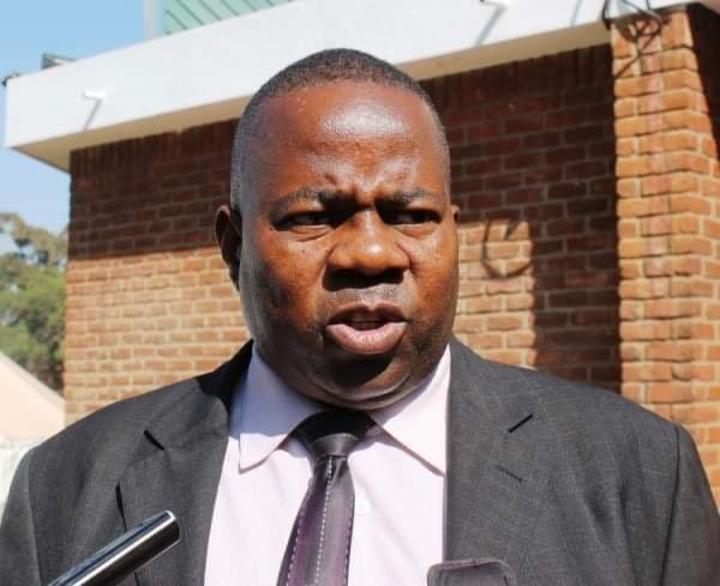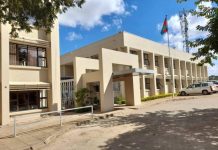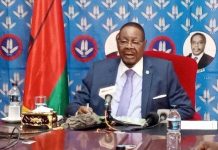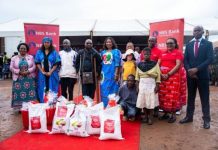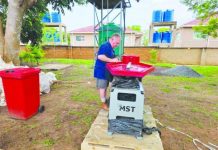Africa-Press – Malawi. President Lazarus Chakwera has appointed Devlin Chokazinga as chairperson of the Board of Malawi Bureau of Standards (MBS) from which he retired as its director general but under whose watch was involved in controversy over sole blank number plates importation.
Meanwhile, the Competition and Fair Trading Commission (CFTC) referred to the Anti-Corruption Bureau (ACB) to investigate if there was any corruption involved in granting the number plates importation to one firm, MOVESA by MBS and Directorate of Road Traffic and Safety Services (DRTSS).
The two government agencies were found guilty by CFTC of anticompetitive conducts on the importation and supply of retro-reflective blank number plates into Malawi and fined K500,000 while leaving the allegation of corruption to be probed by ACB.
The number plate transactions took place when Chokazinga was director general and concerns are being asked by stakeholders in the garage industry of his impartiality once the ACB would reach out to him.
Our source also maintains that Chokazinga shouldn’t have been chosen to as Board director in the first place having worked there before, saying there are Chakwera could have chosen from the general public. Chokazinga was appointed together with Maureen Kachingwe, Nyasinga Pacharo Kaunda, Hendrix Tonde, Dr. Dumisani Chisala and Prof. Leonard Kalindekafe.
CFTC fined MBS and DRTSS for engaging in the anticompetitive conducts when they granted waiver to private firm MOVESA, as sole importer and supplier of number plates, yet the company had failed to meet specific standards.
MBS and DRTSS was also been ordered to “cease and desist from engaging in anticompetitive conducts in the enforcement of standards regarding the importation of blank number plates”.
The two government institutions has also been ordered to “comply with and enforce enacted legislation and/or approved procedures in the regulation of the importation of blank number plates in Malawi”.
The complainant, Bulldog had already petitioned the ACB last year on MBS and DRTSS decision to award MOVESA as the sole blank number plate importer made in 2010 — suspecting that “there might be an element of corruption” involved in the process.
The complainant had asked the ACB to look at the aspect of corruption because the decision to award MOVESA as a sole importer was “to block all players from entering the market” yet MOVESA’s number plates have been “failing to meet the standards many times”.
In its determination made from its 61st meeting held on March 28, 2022, CFTC said following investigations, the Commission found that on 14th April, 2016, Bulldog was granted a licence by DRTSS to import number plate blanks from Yiwu Traffic Signs Ltd only.
“Bulldog proceeded to import 6,000 number plates on the strength of approval from DRTSS and the pre-shipment sample approval from MBS. The consignment arrived on 1st December, 2016.
“On 13th December, 2016 MBS issued an imports monitoring report to Bulldog which declared that the pre-shipment sample received on 1st December 2016 had failed the test under MS639-1.
“Although the Complainant alleged that the pre-shipment sample submitted in 2011 was the same as the consignment in 2016, the Commission found that they were different as they failed on different parameters.
“The Commission also found that although the Complainant alleged that they were tested under different versions of the MS639-1 Standard, the Commission found that the 2011 and 2013 versions of the MS639-1 standard were the same.
“The Commission thus found that there was no discrimination in the application of standards in that regard towards the Complainant.”
When pursuing matter further, the alleged conduct by the Respondents appeared to contravene Section 32(1) of the Competition and Fair Trading Act (CFTA), and the Commission “found that in spite of the fact that Bulldog, MOVESA and other competitors all failed conformance tests under the MS639-1 Standard during the same period, only MOVESA was allowed to import a consignment that had failed a conformance test”.
“The Commission found that the reasons given for having granted a waiver to MOVESA only to do so were unlawful and unjustifiable resulting in MOVESA being granted unfair advantage against its competitors.
“The Commission found that DRTSS engaged in anticompetitive conduct by taking steps to seek a waiver from MBS on MOVESA’s behalf on the alleged grounds that if the waiver was not given there would be a shortage of number plates in the country and yet all the other competitors who had also failed the conformance tests could have also done so (though not lawfully as they had also failed the conformance test).
“Further, the Commission found that the reason for seeking a waiver on MOVESA’s behalf was simply to allow MOVESA not to incur losses for 65,000 number plates that had already been bought and whose pre-shipment sample had failed.
“The Commission also found that MBS engaged in anti-competitive conduct in granting the waiver to MOVESA in that it did so simply because DRTSS requested it to do so without any other reasons and in spite of the fact that it had already communicated to MOVESA that they could not allow them to import a consignment into Malawi whose pre-shipment sample had failed as the Malawi Bureau of Standards Act did not allow them to allow importation of products that did not conform with mandatory standards.”
Thus CFTC found that the actions of MBS and DRTSS were in contravention of Section 32(1) of the CFTA and “also noted with concern that for many years, MOVESA had been the sole provider of number plate blanks in the country and it is only in recent times that another supplier was also engaged”.
In the detailed petition sent to the ACB in September last year, which we have in possession, the complainant indicated that in 2010, DRTSS officially informed Malawian motorists that they needed to change their old number plates to the new SADC standard Retro-Reflective.
He alleged that the process to effect the new traffic regulations MBS and DRTSS as regulators was not tendered out or advertised “so that businesses could apply to become importers of the retro-reflective number plates”. DRTSS is said to have initiated the specifications required in line with the new SADC guidelines while MBS was to enforce the correct standards.
Without tendering, the complainant alleged that MBS wrote MOVESA on March 23, 2011 through a letter ref BS/QAD/58/0, congratulating the company for its registration with the Ministry of Transport on becoming and importer of the retro reflective number plates — license number IMP/RPB/001.
The complainant further quoted the letter of congratulation that it informed MOVESA would, together with MBS, work “to facilitate prevention of importation of substandard blank plates by unscrupulous importers by subjecting [MOVESA’s] consignment for conformity assessment against the Malawi Standard MS 639-1.”
The complainant questioned this arrangement that MOVESA was made a regulator when he was the only importer of number plates and thus blocking other business entities in a country that enjoys liberal market.
The ACB was also made aware that on April 4, 2011 — barely two weeks after being granted the contract — MBS notified MOVESA that his number plates failed the MS 639-1 standard test IQR/11/117 and was asked to notify his supplier for redress.
He also alleged that over the years, many of MOVESA’s sample plates failed the standard tests but they still found their way on the market and todate most of the substandard plates on the roads show different colors, appear with different flags and “some with no Malawi flag at all”.
“Different colour number plates have been supplied and sold to motorists across the country,” alleged the complainant. “Even the regulatory bodies, DRTSS and MBS vehicles have the wrong colour plates from light yellow to dark yellow and some are orange.”
The complainant outlined that some plates have faded well before the expiry date of 2026 and that some flags show black, red and blue instead of green, many have creases (which is a major standard failure) and there’s no luminosity of the reflective material on the plates with some peeling off making it a risk and a safety hazard to motorists.
“All of the above are major parameter failures but the regulatory authority MBS continues to turn a blind eye to MOVESA’s numerous failures and continue allowing him to be the sole importer/preferred supplier resulting in many different substandard number plates being on the market.”
The complainant asked the ACB to investigate the anomalies, saying it was of “national interest and affects the security of the country” since “the diplomatic community, Malawi Police Service, statutory corporations, Immigration, government vehicles and local motorists have all been affected by using different types of number plates which have been imported and sold by the sole/preffered importer”.
“…We have different fake registration number plates on our vehicles which cross borders every single day. We are fortunate not to have our vehicles being stopped at the borders because of different colours, different flags and some with no Malawian flag at all.”
The complainant furthers informed the ACB that DRTSS and MBS kept changing blank number plate importation test specifications to block others business entities — all in favour of MOVESA.
After DRTSS notified Movesa on April 4, 2011 that his number plates failed the MS 639-1 standard test IQR/11/117, MBS is reported to have responded on May 18, 2011 indicating that MOVESA’s fails “should be treated as minor” while on January 4, 2012 both MBS and DRTSS agreed that since the standard was currently under review and to not stop the program, the plates that failed to meet the standard must carry on.
“This was happening when there were other businesses whose number plates had passed the standard MS639-1,” says the complaint letter to the ACB, wondering why MBS did not engage such businesses “to bring correct standard plates”.
The complainant — whose company was told to get his products tested by a laboratory outside MBS mandate — revealed that on January 4, 2012 MBS’ deputy director informed DRTSS that if they allowed “too many importers on the market” before harmonizing the standard “with regulations there would be enforcement challenges that would compromise the integrity in both MBS and DRTSS”.
“We need to ensure that our vehicles are fitted with uniform number plates that can be perceived by the general public as being standardized and the only solution to achieving this is, in our opinion to apply a common yardstick which is essentially the standard currently under review.”
The communication between the two regulators then proposed that they “should suspend registration of prospective importers of number plates [and] to maintain MOVESA in order that the program should not stall”.
The complainant says in May 2015, a separate importer’s test report from MBS passed the standard MS639 2011, which allowed DRTSS to grant his company a license in April 2016 along with serial numbers to start importing number plates.
The importer placed an order with suppliers in China for blank plates and once they arrived a Mr. Chikopa from MBS collected samples for testing on November 30, 2016. But on December 19, the interested importer received communication that the “sample plates had failed the tests and should not be sold but destroyed”.
“They made us order the number plates as shown in the test report of the 15th May, 2015 only to fail once the consignment arrived. We were left trying to figure out which test result was valid.”
The complainant was incredulous that MBS told them to import the product identical to those given for test only to be told they have failed the test and MBS’ official Wanachi Chauluka visited the importer’s offices “to inspect the consignment on 9th February 2017 and placed it under quarantine”.
“What makes us doubt the whole process is that the sole importer Movesa, who has been allowed to import the blank number plates and is still importing, has had his number plates fail the standards but the Bureau treats his fails as minor and ours as major.
“There are serious double standards at work here. I would like to stress that our number plates failed on some minor parameters but passed all major parameters.
“[MBS] seems to be favoring [MOVESA] as he was being allowed to import and sell his number plates that had failed major parameters but instructions were being give to treat the major fails as minor.
“There is need to be a level playing field and not having different standards for different people” as per the “2011 standard used and that has always been in line with the 2010 DRTSS Act and even published in a newspaper advert on the 9th February, 2015.”
The ACB was also noted that former deputy quality assurance service officer Steve Kamuloni was working as a consultant for MOVESA in the implementation of MS639 standard and had attended standard meeting in 2019 at Hapuwani Lodge and Malawi Sun Hotel in 2021 as a representative of MOVESA.
“This is the same individual who was instrumental in manipulating the standard to suit MOVESA,” says the complainant in the detailed 6-page report.
For More News And Analysis About Malawi Follow Africa-Press

